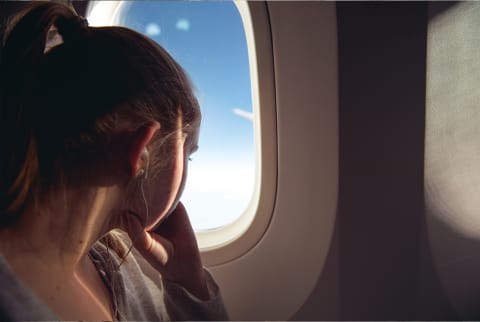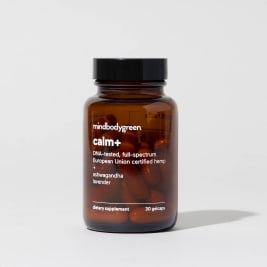A Mindset Trick To Ease Flight Anxiety, From A Psychiatrist Who Studies Hypnosis


Aerophobia, the formal name for the fear of flying, impacts plenty of people but often gets dismissed as "part of the process" that is traveling. However, this fear can be so powerful that it prevents some from traveling at all or throws anxious folks into a spiral when sitting on the plane.
You may have heard some tips and tricks to distract yourself, but the following method that psychiatrist David Spiegel, M.D., co-founder and chief scientific officer of Reveri, recently shared on the mindbodygreen podcast takes a unique self-hypnosis approach. To come, a quick how-to.
A self-hypnosis technique for flight anxiety
"The first step is to get your body comfortable," Spiegel says. So for folks with flight anxiety, invest some time into organizing your flight accessories, like neck pillows, soft blankets, comfortable clothing, stress supplements, etc. Your body and mind are connected, he says, so the tension and cramping you feel in your body may manifest into more anxiety.
Once you're feeling comfortable physically, you'll enter the mindset shift. "Float with the plane and think of [the plane] not as a container that's controlling you but as a comfortable experience," he says. If you prepare your mind to take any turbulence with grace beforehand, it may not catch you off guard and spark anxiety.
"The second thing is to think of the plane like an extension of your body, like a bicycle," Spiegel says. Meaning, you don't think about the contraption while you're riding, since you actively control the pedals. Try to think of the plane in this same way, and try to think of the pilot as an extension of your brain. Both of these scenarios will help you create more of an illusion of control over the safety of the flight, he shares.
Finally, think about the difference between possibility and probability, he says. While it's possible to be involved in a plane crash, it's not necessarily probable. In fact, you probably do many things in your daily life that are more dangerous, like driving a car, for example. Reminding yourself that anxiety surrounds a possibility and not a probability may help ease those jitters, just a bit.
Now, if your anxiety is only related to the takeoff, landing, or short-lived turbulence, Spiegel suggests imagining that you're somewhere else you feel at peace—on a beach, in your bed, etc. This is a classic method that can be used in many different situations of momentary discomfort, be it in an elevator, a crowded space, driving over a bridge, etc.
It's important to note that many mindfulness tricks similar to these work best for folks with anxiety that is somewhat manageable. If your flight anxiety prevents you from flying no matter what relaxing techniques you employ, it may be best to seek professional help.
The takeaway
One way to ease flight anxiety is by establishing a comfortable physical environment, envisioning yourself floating with the plane, and reminding yourself of the probability of your fears. For more self-hypnosis tips, check out the episode below!

Hannah Frye is the Assistant Beauty & Health Editor at mindbodygreen. She has a B.S. in journalism and a minor in women’s, gender, and queer studies from California Polytechnic State University, San Luis Obispo. Hannah has written across lifestyle sections including skin care, women’s health, mental health, sustainability, social media trends, and more. She previously interned for Almost 30, a top-rated health and wellness podcast. In her current role, Hannah reports on the latest beauty trends and innovations, women’s health research, brain health news, and plenty more.

